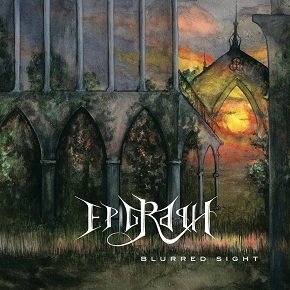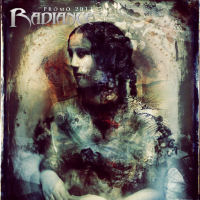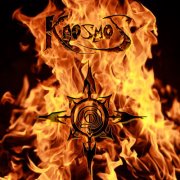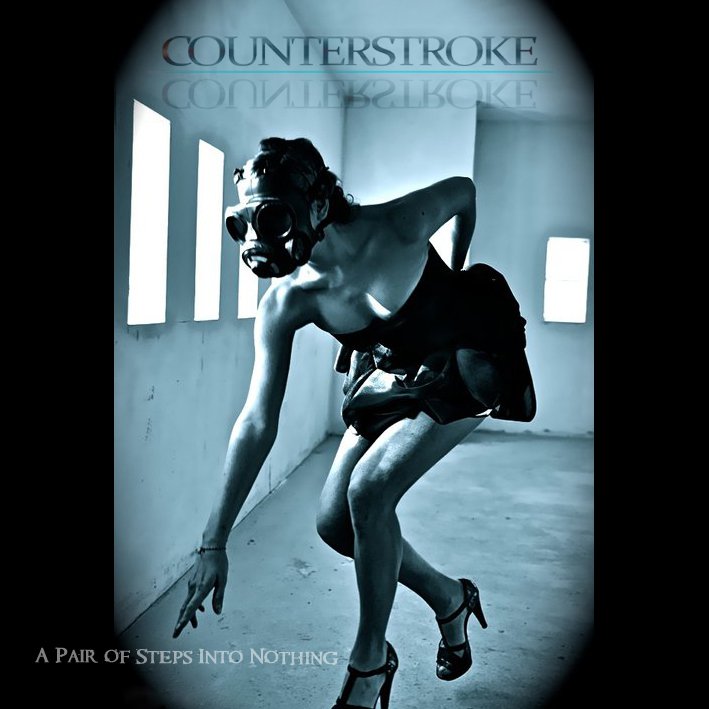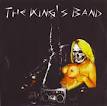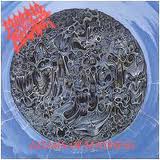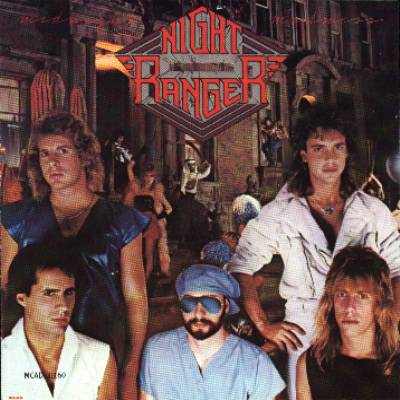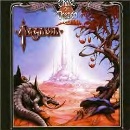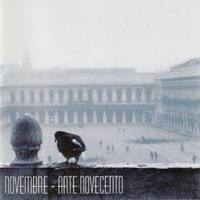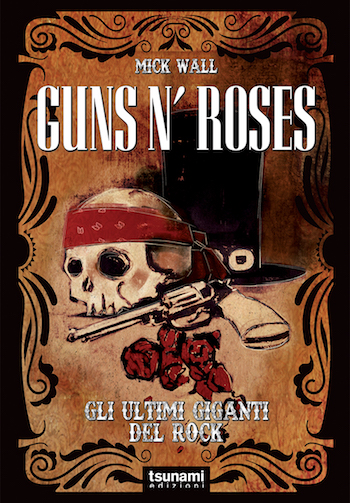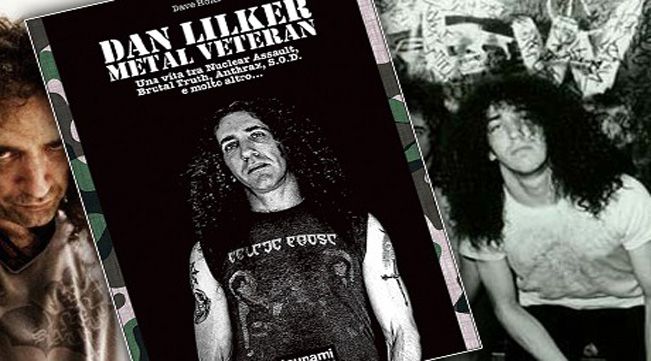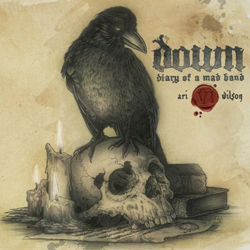Verjnuarmu
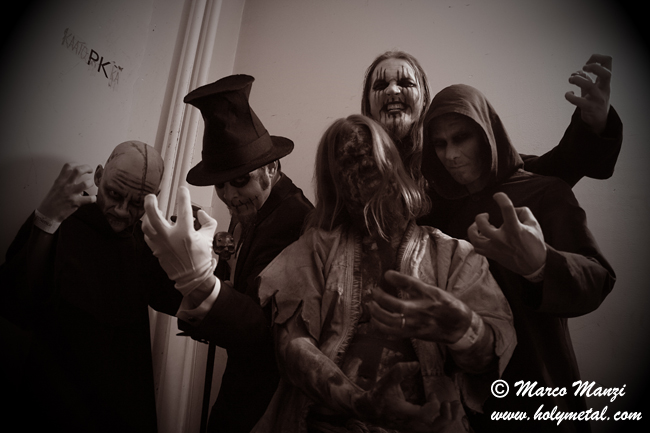
Line up:
Viitakemies - Lead Guitars, Backing Vocals
Tervapiru - Rhythm Guitars
Woema - Bass
Musta Savo - Drums, Harsh Vocals
Verjnuarmu is known mostly for their lyrics in Savo, from where they took the name of "Best Savo Metal band in the world". It’s been about a month from the release of their third record, "Lohuton", and tonight the band is going to perform here in Helsinki at Dante’s Highlight, like they did last January. So we took the opportunity to have a chat with the guitarist Viitakemies, and discuss about the new album and many other curiosities:
Marco: Well, they say that the third album is usually the one that confirms the qualities of a band... So what do you think about it?
Viitakemies: Uhm... I guess that’s true! We have made two albums which were quite different from each other. The first album was a bit more melodic, and maybe not as heavy as the second one. The third album is a sort of a combination of the first two. It has the melodies of the first album and the heaviness, the crudeness of the second, and I have to admit that the third album IS the best!
It truly shows what we are, musically speaking.
M.: So where did you get the inspiration for this "Lohuton"? And by the way, thanks for the simpler name!
V.: Yeah! [laughs] You’re welcome!
Well, we made the album, we made the songs... And we were thinking that the last album, "Ruatokansan Uamunkoetto", was lyrically a kind of theme album. It dealt a lot with death people and ghosts, stuff like that. When we did these songs, there wasn’t any theme on the lyrics. There were some songs that dealt with Finnish folklore, still some songs that dealt with death and ghosts, and so on... But the name was the thing that combines them all together. "Lohuton" means... how would I translate it... basically "without comfort and hope".
All the songs and all the lyrics have maybe not a binding theme, but somehow the undertone that there is no hope of a better life. It’s the feeling of "comfortless", which is all around on the songs. They don’t have any theme, but there’s this kind of feeling, and it’s somehow hard to describe.
M.: Can you try maybe to describe a bit some tracks that you think are more interesting then?
V.: Well... musically the titletrack, "Lohuton", is one of the most interesting for us. Because it has a lot of variety, a lot of different kind of guitar riffs, and stuff that we haven’t done before. Also "Ualtoen Viemät", which combines elements that are very different from each other, but somehow by combining those elements together the song becames a whole... a sort of a masterpiece! I don’t know, it’s just that kind of stuff which I usually like! All that variety and different things combined together...
M.: Ok. And can you tell us which of the new songs are you going to play live and how do you think they will fit into your show?
V.: Currently we are playing five or six new songs: the first single "Kuvajaenen" of course. We have played that song for about six months or so... and it has been a favourite of the crowd. People really like that song. Also the second single, "Turja", and the second video song, "Sysisyvän". Those are quite fast and direct songs, but they also have those melodic choruses, which appeal to the audience. People usually like those songs.
M.: They are like more suited for live shows, you would say?
V.: Yeah, I think so! Because we have played also the titletrack "Lohuton", and it’s quite difficult to play. It has so much of that variety and those tempo-changes that... it’s not a great live song. It’s a great album track, but... I guess it’s not YET a great live song. We have, I think, to practice on it a bit more. It’s hard! [laughs]
M.: I could listen to "Lohuton" only once so far, when there was this streaming preview on the Levykauppa Äx website, and I believe it’s a really good thing that the fans and the audience have the possibility to listen to this in streaming for a limited time, so that they can decide if they want to buy the cd or not. What’s your thought on this?
V.: Yeah, the idea of that came from Levykauppa Äx. They’ve done it before with other bands, and we thought that by making the album available, so that people could listen to it before, they would have had realistic expectations on it. So they wouldn’t have been disappointed when they buy it. And maybe they would easily buy it when they know the songs, and know what the album will be like!
M.: Yes, at least you don’t have to go and buy something that you have no idea how is going to be!
V.: Well, nowadays the thing is that mostly the bands, or record labels, make a single, and promote the album through the single. It has a video, and when the listener likes it, it goes like "hey, it’s a great single, I’ll buy the album!". Then it’s the only great track on that album! That’s how people gets disappointed and won’t buy new records anymore.
M.: Yeah. And it’s a shame that it has to go like this. But speaking about record companies, I think if I’m not mistaken that with three albums you have changed three labels!
V.: Yeah, yeah! [laughs] We have!
M.: How come?
V.: Uhm... Basically the first record company, Universal Music, was a big multinational company, that sort of "tried" us... because we were the first band to sing with Savo dialect. So they gave it a chance... "Let’s try if people like this!". And I don’t know if they had expectations that it would sell more, maybe, or what else... but the first album was good and they liked it, and it sold about 3000 copies. But when we made the demos for the second album the songs weren’t so catchy and so melodic. And they thought that maybe people wouldn’t have bought it anymore. Basically that’s the reason why we had to change the record company, they weren’t interested to release it anymore.
The second company, Dynamic Arts, was so much smaller, that they didn’t have the resources to make us as big as we could have become with Universal Music. And with the third company, the Osasto-A Records, it was really easy, and it is still really easy, to come up with ideas, have a conversation with them by phone and meet. Because the people from that company live in the same town as we do [Kuopio]. So we can anytime call, have a coffee and have a conversation about anything!
With the other two companies, Universal and Dynamic Arts Music, everytime we had to decide something big, or have a meeting, we had to come to Southern Finland by train or something. But now we can meet basically everyday.
M.: Well there sure is much more communication!
V.: Yeah, there has been much more communication nowadays.
M.: But how did the whole idea of Verjnuarmu started? I think everyone has probably asked you this, but I have to!
V.: Yeah! [laughs] It’s a really basic question. The previous guitar player, Savon Surma, and the drummer, Musta Savo, had a studio project. Then they thought "Let’s make some songs and play them together!". And they were thinking that since we speak this dialect of Savo, why hasn’t anyone done this before? Why isn’t anyone singing metal in Savo lyrics?
So it was quite natural for them to try that. It was first just a studio project, they didn’t expect to have any kind of success or anything. So after a few years and a few demos they thought that maybe they should have tried to get all the other players and do some live shows, make the costumes and all those things. And that’s how the idea, which was more or less a "joke" in the start, didn’t sound like a joke anymore! It was more like "hey, it’s a really good idea!".
M.: "We can do this!"
V.: Yeah! And after the first live shows, WE thought that this was a really great idea! And the audience also thought "hey, this is something new!". And that’s how it all started.
M.: And what about the costumes? Who had the idea to make those, and all the stories behind the characters etc.? Because they are quite a big aspect of your shows I think.
V.: Yeah!
M.: It reminds me somehow about all those theatrical elements as in Alice Cooper for example, even though much smaller of course!
V.: Yes, we thought that it would have been nice to offer to the audience something "extra". Something special. Like those norwegian black metal bands, or Alice Cooper, W.A.S.P., Twisted Sister... all the great bands from the eighties, which I loved the most When I was a kid!
Blackie Lawless of W.A.S.P., with those leather outfits, all the blood and gore and that stuff... it was really cool! And it was for us a sort of experiment. We try to make the people feel the same thing as we did when we were kids, and listened to those bands. So, the music is great, and when you add the costumes and those elements it becomes somehow better.
M.: And those bands actually still do the same things now that they are like 50 years old or more!
V.: Yeah, they do! [laughs] In 2006 I saw Twisted Sister after listening to the band for... 24 years! When I saw it, I basically cried all the time, because for me it was so great! They were really old, and they were on their 30th anniversary tour, and they must be 50, 55 or maybe 60 years old now! [laughs] [Dee Snider is exactly 55]
M.: And sure is a great thing to still have the chance as a fan to see those bands playing live. But instead, as you mentioned, one thing that makes you "special" is the fact that you sing in this Savo dialect. Personally I think that already Finnish in itself is a quite difficult language! [laughs] And I heard that even for Finnish people who don’t know Savo, that this dialect is quite difficult to understand, is that true?
V.: Yeah it is! People from Southern Finland, or from all around Finland, they don’t really understand Savo. Because it has some pretty strange words, and it sounds a bit funny! You could compare it to the dialects in the United States. Like those people in the Southern States, for example Texas, have a very distinct dialect, that other people think it sounds somehow... well, maybe funny! And basically Savo is like the Texas of Finland! [laughs] Or something like that!
M.: [laughs] But you don’t have the death penalty!
V.: No no, we don’t! [laughs]
M.: So, how much would you say that your cultural background, and your traditions affect your music?
V.: A lot. They have affected us a lot on our lyrics, but musically all the Finns like that melancholic stuff. And somehow, all the melancholic stuff that WE do, sounds a bit "Finnish", for people outside Finland. It’s a bit hard to distinguish the elements or all the influences and where they come from. But all the traditional Finnish folk music that we have listened and heard when we were kids of course have affected our music.
M.: What about the history?
V.: That also. Lyrically, Puijon Perkele, the vocalist, has read a lot of Finnish and Savonian history and folklore. And it’s basically our main influence, lyrics-wise.
M.: So how much do you know instead about the history of your region?
V.: Basically it’s him and me who read the most of those historical things, and we try to discuss which themes are the most appropriate for the band.
M.: Can you give us some example?
V.: Just a second, I’ll look on the album! [laughs, while taking out the new cd from a bag nearby, and start reading the booklet]
Well, this is something... "Vette" [from the song "Vetteinen"] is a character in the Finnish folklore, basically like a thing/person that lives in the water and who attacks fishermen and so on. He, or she, might be a death person, who attacks people from the water. It’s hard to explain it in English, because it has so many characteristics that are so Finnish! That are typical to our culture.
M.: And I know that a lot of Finnish words don’t have any direct translation in English...
V.: Yeah, exactly.
M.: Well, it’s ok then, I forgive you! [laughs]
V.: Ok! [laughs]
M.: There is instead a friend of mine, which is in Italy and is nicknamed "Savo". He is a fan of yours, and he asked me why you are not supported abroad and if you would like to play in Italy, of course, and abroad in general. If you have the occasion to do that.
V.: Well, at the moment we are still a small band. If we had the money to tour, we would definitely tour Europe. But it would require of course some money, and then few people of the band have kids and stuff like that. So it’s not easy for them to go out tour. It’s hard.
M.: Maybe you would need some session players?
V.: No, I don’t think we would do it with session players. The only thing that we can do is a mini-tour, like a week or so. And we are planning to do that at some point of our career, but maybe not now. Maybe later.
M.: Because you have fans also in Germany for example, that I know like your band. So where would you think you would have the best chances to play, or where would you like to play?
V.: Personally I think all the big metal festivals would be great for us. Like Dynamo Open Air, or something like that. Germany would be nice, it would be really nice. Italy and France also. And maybe those countries in Eastern Europe, like...
M.: The baltic Republics?
V.: Yeah, baltic Republics, Slovakia and Poland as well...
M.: Ok. And of course it would be much better to play for example when you are in Kuopio, where everyone knows the band and the songs. So how do you think it could be to play in a foreign country where people maybe has just heard your name, or not even that?
V.: I don’t know. I guess it would be interesting, because when we would play in some other country, people wouldn’t understand a bit from our lyrics, so they would mostly listen to the music. And it could be nice! I don’t know, we have to try that at some point!
M.: Yeah, you definitely have to! And I saw you in this video for the song "Sysisyvän", I was curious about where did you do it, and why a live video?
V.: It was last summer at Kuopio Rock Festival in Kupio, and Sandels Rock Festival in Iisalmi. The thing that we did a live video it’s because it was really cheap to make. All we had to do is play. Which is easy! Basically it was cheap to do, and we had a nice audience in Kuopio and on the Sandels Rock Festival.
M.: Do you think you are going to have some other clip for other songs, maybe later or...?
V.: I don’t know, not yet. It would be nice to make a video, but usually it requires a budget of 5 to 10.000€, which I don’t think we can afford if the video isn’t showed anywhere else but on the Internet. Because it’s really hard to get your video on Finnish TV. Especially when you are playing music like this, which is quite heavy.
M.: There’s basically only that night program on Voice TV.
V.: Yeah, but they sort of didn’t like us... and in Finland we don’t have many of those programs. Only Voice and MTV Finland.
M.: Ah, MTV is bad!
V.: It is! [laughs] And they don’t like us.
M.: So I guess that if you don’t have resources for a video, it would take some time before you make a DVD!
V.: Yeah, it could take years.
M.: It would be nice maybe if you play in some big festival.
V.: Yeah, well... we have been thinking of doing that for years now. But it should have from 5 to 10 cameras, high quality sound, and basically it would cost a lot. Or maybe not a lot, but enough.
M.: Well, do you want to add something more for your Finnish and foreign fans?
V.: I don’t know. Listen to Metal. Buy our albums, and come to see our shows if you have the opportunity to do that! I guess that’s all.
M.: Ok, thanks for your time then and good luck for the show!
V.: You’re welcome, and thank you!
Archivio Foto
Recensioni demo
Siamo alla ricerca di un nuovo addetto per la sezione DEMO, gli interessati possono contattare lo staff di Holy Metal, nel frattempo la sezione demo rimane temporaneamente chiusa.



